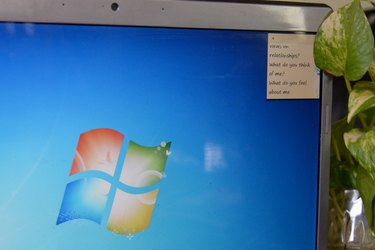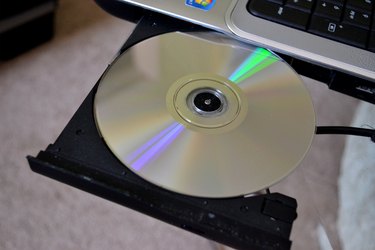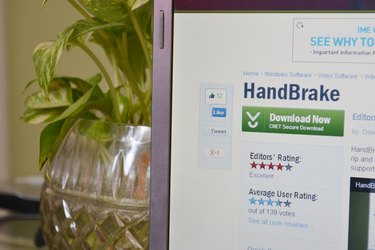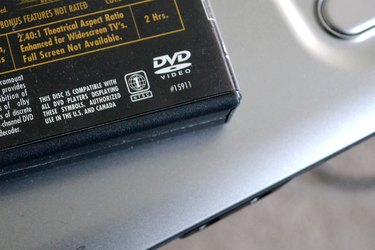
Windows-running laptops can play DVDs; however, the software and permissions necessary to make it work vary between operating system versions. While Windows 7 included built-in DVD compatibility, the preceding and superseding versions require you to use additional software or pay for an upgrade. The laptop needs to have access to a DVD drive to play discs; however you can rip many DVDs and play them back as media files on devices that don't have optical drives.
Play DVD Optical Drive
Video of the Day

Before software concerns come in, the laptop must have either a built-in or externally connected DVD player to be compatible with DVDs (Blu-ray drives are backwards compatible with DVD). You can upgrade to the Media Center Pack to add DVD playback to Windows 8 through the "Add Features" menu. However, you will only be able to play DVDs in the Media Center window and not in Windows Media Player. Additionally, RT devices do not support DVD playback. To play the DVD after installation, load the Media Center, insert the DVD in the optical drive, select the "Movies" option and choose "Play DVD."
Video of the Day
Third-Party Player Options

You can watch DVD movies on a laptop without spending any extra money through a third-party media player. Computer technology websites ExtremeTech, PCWorld, Cnet and Gizmag all recommend the open-source VLC media player for free DVD playback. This is available for download at the VideoLan Organization website (see Resources). Once you've loaded VLC, you can start playing your DVD by selecting the "Open Disc" option from the Media menu. Alternatively, the GOM Media Player and MPC-HC (Media Player Classic Home Cinema) programs provide free DVD playback as well.
Play a Ripped DVD

Copying a DVD to a computer hard drive and expecting it to play won't work: the video needs to be converted. If the DVD doesn't include a streaming or file-based version, you can try to rip the movie from the DVD disc. However, this process may be illegal, depending on the content of the disc and your national laws. You can use a program like HandBrake to rip and convert DVDs to the Windows Media Player compatible MP4 format (see Resources). You can watch a DVD that comes with "Digital Copy," "Ultraviolet," or similar service by redeeming the download code or copying the video file to your computer from the included backup copy disc.
Region Codes and Compatibility

Manufacturers use Region Codes to control which countries can play specific DVDs. The disc will only play if it matches your laptop's DVD player region code. The United States and Canada are within "Region 1," whereas Japan and most of Europe are in "Region 2." The logic behind the different regions is that the studio may want to restrict someone from one country, where a movie is still theaters, from importing a copy of that movie from another country that has completed the theatrical run.
- Microsoft Windows: DVD Playback Options for Windows
- Extreme Tech: How to Play DVDs and Blu-ray Discs in Windows 8
- PC World: How to Play DVDs and Blu-ray Discs in Windows 8
- Cnet: How to Watch DVDs in Windows 8
- Gizmag: Five Powerful Free Apps to Play DVDs on Windows 8
- Amazon Help & Customer Service: About DVD Region Specifications
- Code Free DVD: What are DVD and Blu-ray Region Codes
- Universal Hi-Def: What Is Digital Copy?
- Ultraviolet: Watch Anywhere, Across Your Favorite Devices
- VideoLAN Organization: VLC Media Player
- Download.com: GOM Media Player
- Download.com: Media Player Classic Home Cinema
- HandBrake: The Open Source Video Transcoder
- Microsoft Windows: Get More from Windows 8.1
- Microsoft Windows: Getting Apps for Your PC